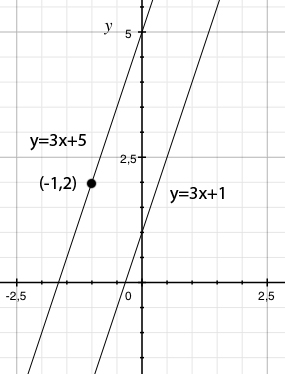Solution 2.2:5c
From Förberedande kurs i matematik 1
(Difference between revisions)
m (Lösning 2.2:5c moved to Solution 2.2:5c: Robot: moved page) |
|||
| Line 1: | Line 1: | ||
| + | Two straight lines are parallel if they have the same gradient. From the line | ||
| + | <math>y=3x+1</math>, we can read off that it has a gradient of | ||
| + | <math>3</math> | ||
| + | (the coefficient in front of | ||
| + | <math>x</math> | ||
| + | ), and hence the equation we are looking for has an equation of the form | ||
| + | |||
| + | |||
| + | <math>y=3x+m</math> | ||
| + | |||
| + | |||
| + | where | ||
| + | <math>m</math> | ||
| + | is a constant. The condition that the line should also contain the point | ||
| + | <math>\left( -1 \right.,\left. 2 \right)</math> | ||
| + | means that the point should satisfy the equation of the line | ||
| + | |||
| + | |||
| + | <math>2=3\left( -1 \right)+m</math> | ||
| + | |||
| + | |||
| + | which gives | ||
| + | <math>m=5</math>. Hence, the equation of the line is | ||
| + | <math>y=3x+5</math>. | ||
| + | |||
| + | |||
{{NAVCONTENT_START}} | {{NAVCONTENT_START}} | ||
[[Image:S1_2_2_5_c.jpg]] | [[Image:S1_2_2_5_c.jpg]] | ||
<!--<center> [[Image:2_2_5c.png]] </center>--> | <!--<center> [[Image:2_2_5c.png]] </center>--> | ||
{{NAVCONTENT_STOP}} | {{NAVCONTENT_STOP}} | ||
Revision as of 09:25, 18 September 2008
Two straight lines are parallel if they have the same gradient. From the line \displaystyle y=3x+1, we can read off that it has a gradient of \displaystyle 3 (the coefficient in front of \displaystyle x ), and hence the equation we are looking for has an equation of the form
\displaystyle y=3x+m
where
\displaystyle m
is a constant. The condition that the line should also contain the point
\displaystyle \left( -1 \right.,\left. 2 \right)
means that the point should satisfy the equation of the line
\displaystyle 2=3\left( -1 \right)+m
which gives
\displaystyle m=5. Hence, the equation of the line is
\displaystyle y=3x+5.

